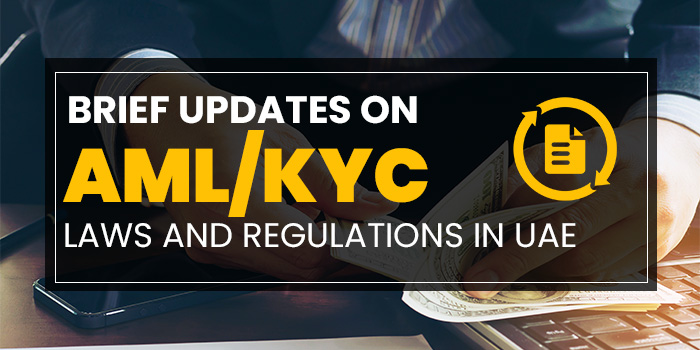The United Arab Emirates (UAE) has a robust legal framework to prevent money laundering and terrorist financing. As the financial hub of the Middle East, the UAE has implemented strict Anti-Money Laundering (AML) and Know Your Customer (KYC) laws and regulations to ensure that its financial system is secure and transparent.
KYC procedures are an integral part of the AML and it is tempting for people to use the two terms interchangeably. Most people fail to recognize how they differ in the regulatory context. Consulting with AML consultants in Dubai is the best way to understand where to draw a line of difference between the two.
What is KYC?
The KYC process is a mandatory requirement for financial institutions and designated non-financial businesses and professions (DNFBPs) in the UAE to comply with anti-money laundering and countering the financing of terrorism (AML-CFT) laws. This includes Auditors, Real Estate Agents, Dealers of Precious Metals and Precious Stones, and Trust & Corporate Service Providers. The KYC process enables businesses to gather crucial information about potential customers, confirm their identity, and assess the risk of potential financial activities. It is commonly used by banks and lenders due to the high risk of money laundering.
What is Anti-Money Laundering?
Anti-Money Laundering (AML) is a broad term for the regulations and guidelines that DNFBPs and financial institutions must follow to prevent money laundering. The AML-CFT laws assist companies in detecting potentially illegal transactions and combatting the crime of money laundering. The UAE government has implemented these laws to fulfill its obligation to the Financial Action Task Force (FATF) and prevent laundered money from entering the legitimate financial system.
Key differences between KYC and AML:
It is important for financial institutions and designated non-financial businesses and professions (DNFBPs) to comprehend the distinction between KYC and AML-CFT procedures before developing an AML-CFT framework.
| KYC(Know Your Customer) | AML(Anti-Money Laundering) |
| In the KYC process, a company gathers relevant customer information and assesses it based on various criteria. | AML establishes procedures and safeguards to mitigate the risk of money laundering and other financial crimes. |
| KYC is used to help entities verify the identity of the customers. | AML procedures aim to prevent individuals or criminal organizations from committing financial crimes such as money laundering. Through AML, financial sanctions are utilized to exert pressure on a regime, limit a target, express disapproval, and secure assets. |
| The KYC process is all about customer Screening, identity verification, and Risk Profiling. | AML is an umbrella term encompassing regulations, Policies, controls, Suspicious Activity Reports (SAR), etc. |
| The KYC process adopts a risk-based approach, allowing relevant entities to detect fake and fraudulent customers. | AML assists relevant entities in complying with new regulations and establishing a robust AML-CFT compliance framework to deter financial crimes. |
Where and when are KYC and AML required?
AML compliance, including KYC, is mandatory for regulated entities under AML/CFT regulations. The scope of regulated entities varies across jurisdictions. Usually, this includes
- Financial institutions
- Credit institutions
- Insurance companies
- E-money institutions
- Payment institutions
- Virtual Assets Service Providers (VASPs)
- Real Estate Agents & Brokers
- Dealers in Precious Metals & Stones
- Independent Legal Professionals & Accountants
- Corporate Service Providers
KYC/CDD is required in a number of cases described by national AML regulations. Usually, they include but are not limited to, cases when the client:
- Establishes a relationship with a business for the first time (for example, opening an account at a bank or crypto exchange platform);
- Makes a transaction exceeding the amount defined by AML regulations;
- Poses suspicions in relation to money laundering/terrorist financing.
Relevant Legislations:
There are a variety of laws on AML/CFT activities in the UAE. The most important are:
- i) The Federal Decree-Law No. (20) of 2018 governs Anti-Money Laundering and Counter-Terrorism Financing measures, as well as the financing of illegal organizations in the UAE. This law, commonly referred to as the AML-CFT Law, sets out the legal framework for the prevention and detection of financial crimes in the country.
- ii) The Cabinet Decision No. (10) of 2019 outlines the implementing regulations for Federal Decree-Law No. (20) of 2018 on Anti-Money Laundering and Combating the Financing of Terrorism and Illegal Organizations. This decision, referred to as the AML-CFT Decision, provides the necessary guidelines for the effective implementation and enforcement of the AML-CFT Law.
According to the AML-CFT Law, a person acts unlawfully if they knowingly commit one of the following crimes:
- Transferring or transporting proceeds of crime with intent to conceal or disguise its illicit origin;
- Concealing or disguising the true nature, origin, location, way of disposition, movement, or rights related to any proceeds or the ownership thereof;
- Acquiring, possessing, or using such proceeds;
- Assisting the perpetrator of the predicate offense to escape punishment.
How do KYC and AML procedures differ?
Despite the fact that many people confuse the terms KYC and AML, the two frameworks are distinct. The goals and procedures of the AML-CFT and KYC processes also vary. AML can be seen as a more general word that refers to various tasks. An AML framework aids FIs and DNFBPs in ensuring compliance, protecting themselves from financial crime by spotting suspicious transactions, and preventing criminals or criminal organizations from legalizing illicit cash. The AML compliance procedure is frequently outsourced to AML consultants in Dubai, United Arab Emirates. More significantly, AML also consists of the following:
- AML / CFT Policy Controls and Procedures Documentation
- AML/ CFT compliance assessment
- AML Training
- Annual AML CFT risk assessment report
- AML software selection
- Appointing AML compliance officer
Consult with the Best AML-CFT Consultants in Dubai, UAE
To ensure AML compliance in UAE, it is crucial to understand the parallels and differences between AML & KYC. However, organizations are urged to collaborate with the top AML consultants in Dubai to put in place a reliable AML-CFT framework within their business. One of the top AML consultants in Dubai, Elevate Accounting and Auditing provides customized compliance services. We assist FIs and DNFBPs with AML-CFT compliance. Elevate offers AML services in UAE including building a solid AML-CFT framework, teaching AML, providing AML training, and providing AML-CFT penalties.
What Elevate can do for you?
- Prepare and document AML/CFT Policies, Procedures, and Controls.
- Compliance Assistance including notifying relevant updates and guiding to adhere to the same.
- Registration on GoAML Portal.
- AML/CFT Awareness and Training programs.
- Know your Customer checks.
- Gap Assessment and providing a periodic review.
- Provide a periodical MLRO Report.

